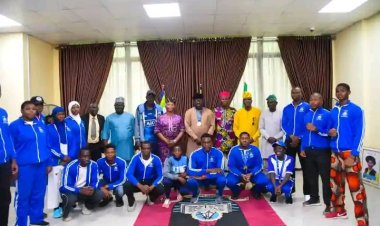From College to University: The Transformational Journey of Ignatius Ajuru University of Education
Ignatius Ajuru University of Education (IAUE), a prominent Nigerian university, has undergone a significant transformation since its inception. Originally established in June 1971 as the Rivers State College of Education, it operated under that name until October 2009 when it was elevated to university status.

Ignatius Ajuru University of Education (IAUE), a prominent Nigerian university, has undergone a significant transformation since its inception. Originally established in June 1971 as the Rivers State College of Education, it operated under that name until October 2009 when it was elevated to university status. This transformation reflects the institution's growth and its evolving role in Nigeria's educational landscape.

The Rivers State College of Education was created as an autonomous institution to provide quality teacher education and play a dynamic role in society. It was governed by a Council responsible for the recruitment of staff and the overall administrative and financial control of the institution. In 1975, Mr. E. Aguma was appointed Principal and later became the first Provost of the College, overseeing its early development. That same year, Dr. E.T. Green succeeded Mr. Alagoa as the Chairman of the Governing Council, and a new leadership team, including Provost Mr. R.I.C. Koko, was appointed following a change in government.
The move to the college’s permanent site at Rumuolumeni in 1977 was a significant milestone. Although some essential facilities were still under development, the relocation allowed for further growth and improvement. A landmark event occurred on March 11, 1978, when the college held its first graduation ceremony, conferring diplomas upon 462 students who had completed the Nigeria Certificate in Education (NCE) program.
In May 1982, the college expanded its offerings by introducing degree programs, matriculating its first batch of students for the Bachelor of Education (B.Ed.) degree. By the end of the 1983/84 academic session, a total of 3,169 students had graduated from the college, including 2,504 from the NCE program, 531 from the Advanced Certificate in Education (ACE), and 134 with B.Ed. degrees. Rivers State College of Education was the only College of Education affiliated with the University of Ibadan offering the Bachelor of Education degree at the time.
In the early 1980s, the government’s initiative to increase the number of teachers in the state through degree programs saw further support from the Rivers State Government. Under the leadership of Professor G.O.M. Tasie, appointed as Provost, the college began offering its own degree programs, solidifying its status as a center for teacher education. The College continued to grow, with its transition to a university in 2009 marking a new chapter in its history.
The transformation into Ignatius Ajuru University of Education was driven by the Rivers State Government’s desire to offer more high-quality educational opportunities to its citizens. Given that the college had been awarding degrees in affiliation with the University of Ibadan for years, the transition was smooth. Many graduates of the former Rivers State College of Education also sought to further their academic qualifications by obtaining university degrees.
IAUE was officially established by the University of Education Law No. 8 of 2009, passed by the Rivers State House of Assembly on October 15, 2009. The law was subsequently approved by Chief Rotimi Amaechi, then Executive Governor of Rivers State, on October 20, 2009. IAUE became the second state-owned university in Rivers State, offering a wide range of undergraduate and postgraduate programs.
Today, IAUE continues to fulfill its mission of providing high-quality education, particularly in the field of teacher training, under the leadership of its current Vice-Chancellor, Professor Okey Onuchukwu. The university’s legacy, rooted in its history as a college of education, continues to grow as it adapts to the evolving needs of Nigeria's educational system.





